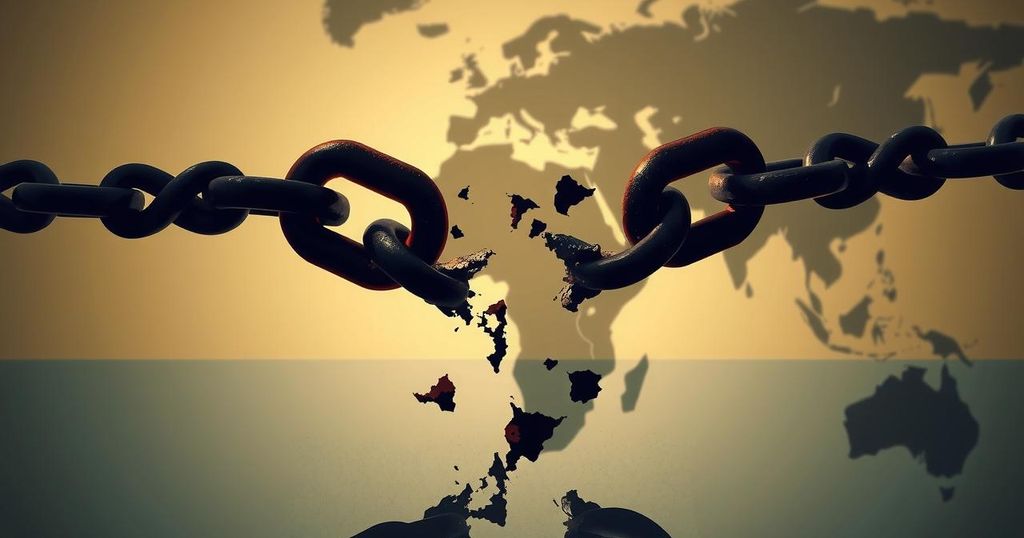Mali Junta Chief Reevaluates Military Strategy Following Deadly Jihadist Assaults
Mali’s junta leader, Colonel Assimi Goita, convened military officials to reassess security strategies following lethal jihadist attacks in Bamako that killed over 75 people. The Al-Qaeda-affiliated group JNIM has claimed responsibility for the unprecedented violence, raising serious questions about military effectiveness and security governance in Mali, leading to calls for accountability and strategic reform.
In response to recent lethal jihadist attacks, Mali’s junta chief convened a meeting with senior military officials to reassess security strategies. This meeting followed a coordinated assault in Bamako, which led to the tragic deaths of over 75 individuals and left more than 250 injured, as reported by security personnel. An Al-Qaeda-affiliated group, the Group to Support Islam and Muslims (JNIM), claimed responsibility for these unprecedented assaults on the capital, targeting crucial sites such as the main airport and a military police training facility. During the meeting, the presidency announced that officials engaged in a thorough evaluation of existing security measures, recalibrated threat assessments, and initiated the development of new operational guidelines. Mali’s military leader, Colonel Assimi Goita, delivered his first address since the attacks, honoring the victims and emphasizing the necessity for heightened vigilance and adaptability in military operations. Experts have described these attacks as a significant setback for the junta, which has governed Mali following a series of coups in 2020 and 2021. The series of events raises serious questions about the junta’s proclaimed control over security, particularly given the longstanding presence of jihadist groups in the region. Many citizens have echoed sentiments of accountability on social media, criticizing what they view as severe lapses in security oversight. The group JNIM stated that 13 of its fighters executed the attack, asserting that all detainees arrested by the authorities were wrongly accused. This incident marks the first major attack in Bamako in several years, contrasting sharply with the persistent violence that has afflicted other areas of Mali. The assaults occurred shortly after leaders of Mali, Niger, and Burkina Faso commemorated the one-year anniversary of their military alliance, the Alliance of Sahel States (AES), during which they fortified ties with new military partners such as Russia while severing links with former colonial power France. In recent military actions, the Malian government had successfully recaptured territory in northern Mali from armed jihadist and separatist factions. However, a noted setback was suffered in July when the army and its Russian allies encountered significant defeat. Previously, France’s anti-jihadist Barkhane force and international organizations such as the United Nations had played pivotal roles in curbing threats in northern Mali. Conversely, the junta has opted to expel these forces, aligning itself with non-Western military support instead.
Mali has been experiencing significant challenges with insurgency and terrorism, particularly from jihadist groups linked to Al-Qaeda and the Islamic State in the region. The junta that took power in recent years has faced mounting pressure to stabilize the country while dealing with frequent violent incidents, raising concerns about its military strategy and overall effectiveness in ensuring public security. Following coups in 2020 and 2021, Mali’s leadership has sought to establish new military alliances and distance itself from former colonial forces, primarily France, in favor of partnerships with countries such as Russia.
The recent devastating jihadist attacks on Bamako have spurred Mali’s junta to reconsider its military strategies in an effort to enhance security and restore public confidence. These attacks have not only resulted in numerous casualties but have also exposed critical weaknesses in the junta’s efforts to manage the ongoing threat posed by armed groups. Consequently, the situation emphasizes the urgent need for a reassessment of Mali’s overall security policies and highlights the importance of accountability in the wake of such tragedies.
Original Source: www.barrons.com







Post Comment